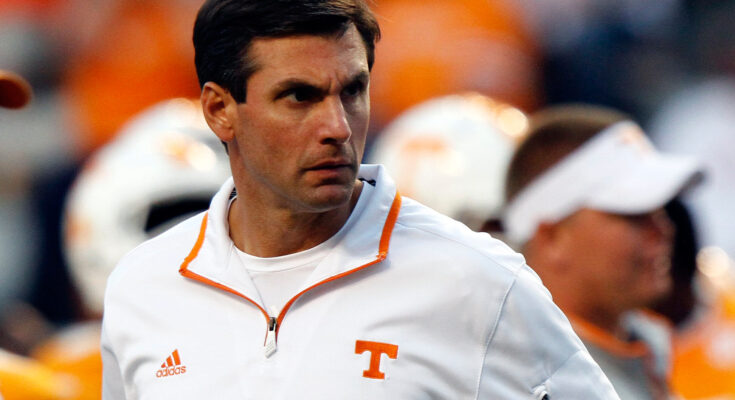BREAKING NEWS: Derek Dooley, a former Tennessee football coach, is considering running for the Georgia Senate
Derek Dooley, once known primarily for his career on the sidelines as a college football coach, is now drawing attention for a potential leap into the political arena. The former University of Tennessee head football coach and son of legendary Georgia coach Vince Dooley is seriously considering a run for the United States Senate in his home state of Georgia. While he has not yet officially launched a campaign, Dooley has confirmed that he is weighing the decision and expects to reach a conclusion in the coming weeks. If he moves forward, he will enter the race as a Republican, potentially seeking to unseat Democratic Senator Jon Ossoff in the 2026 election.
Dooley’s name carries weight in Georgia—not only because of his famous father but also due to his own extensive coaching resume and his deep roots in the state. He grew up in Athens, Georgia, the son of a college football icon, and spent much of his life connected to football at the collegiate and professional levels. His ties to the community and the state’s sports culture could serve as a strong foundation if he chooses to pursue public office. At the same time, his lack of political experience and a relatively low profile in recent years could present obstacles as he navigates the complex terrain of a modern Senate campaign.
In early conversations with the media and political insiders, Dooley described his potential candidacy as a response to what he sees as a need for “common-sense leadership” in Washington. He has expressed frustration with the current state of national politics, suggesting that too many lawmakers are entrenched in partisanship and self-interest rather than working to solve real problems. While he has yet to release a formal platform, Dooley’s comments suggest that his campaign would focus on pragmatism, leadership, and a belief that government can function more effectively with the right people in office.
Though Dooley has not previously held political office, he is no stranger to public scrutiny or high-pressure environments. His time at Tennessee was marked by both challenges and attention. Between 2010 and 2012, he served as the head football coach for the Volunteers, compiling a 15-21 record before being let go in the wake of underwhelming performances and high expectations. Prior to Tennessee, he had stints at Louisiana Tech and served as an assistant under Nick Saban at LSU and with the Miami Dolphins. After his tenure at Tennessee, he went on to hold positions with the Dallas Cowboys and the University of Missouri. His coaching career, though mixed in terms of results, gave him extensive experience managing teams, leading people, and working in highly competitive environments—qualities he now believes translate well into the world of politics.
If Dooley runs, he will do so as a Republican, and early indications are that he may attract support from some of the party’s key figures in Georgia. He has personal and professional relationships with several influential GOP leaders in the state, including Governor Brian Kemp. The connection between Dooley and Kemp dates back to childhood, when Kemp vacationed with the Dooley family and maintained a close friendship with Derek’s brother. This longstanding relationship has fueled speculation that Kemp and his political network may back Dooley as a candidate, especially as Republicans seek a strong, unified challenge to Senator Ossoff.
Dooley has already enlisted experienced political advisors with ties to Kemp to help him explore the viability of a campaign. This move suggests that he is taking the possibility seriously and is not merely floating the idea without preparation. His team has begun assessing the political landscape, considering factors such as fundraising potential, polling, voter sentiment, and how his outsider status might play in a state that has become one of the most politically competitive in the country. Georgia, once a Republican stronghold, has shifted significantly in recent years, electing both a Democratic president and two Democratic U.S. Senators since 2020.
Still, Dooley’s path is far from guaranteed. For one, he would need to navigate a Republican primary that could include several seasoned politicians. Names such as Representative Buddy Carter, Representative Mike Collins, and others have been floated as potential contenders for the nomination. These individuals already have established political bases, legislative records, and fundraising machines in place, which could make them formidable opponents. However, Dooley’s lack of a political record might also be an advantage, as it allows him to define himself to voters without the baggage of past policy decisions or partisan votes.
One of the criticisms already leveled against Dooley relates to his limited participation in past elections and political processes. Records show that he did not vote in several presidential elections while living out of state, and at times he was registered as an unaffiliated voter. Some Republican activists have questioned whether he has the ideological credentials or consistency they want in a Senate candidate. These concerns could surface more prominently if he enters the race, particularly among more conservative primary voters who expect a strong commitment to party values and involvement.
In response, Dooley’s allies have argued that his outsider status is exactly what the GOP needs in Georgia to appeal to swing voters and independents. They believe that his name recognition, especially in a state with a deep love for football, and his personal story could help him connect with voters who are disillusioned with traditional politicians. They also believe that his potential support from Kemp’s network could give him a strong organizational foundation, especially in the critical early months of a campaign.
There is also the legacy factor. Being the son of Vince Dooley carries weight in Georgia, particularly among older voters and longtime University of Georgia fans. Vince Dooley was not just a winning football coach—he was a symbol of integrity and leadership in the state for decades. Derek Dooley’s ability to draw on that legacy, while also establishing himself as his own man with a modern political message, could resonate with many voters who value tradition but also seek change.
Political observers have compared Dooley’s possible run to other recent examples of sports figures entering politics, most notably Herschel Walker’s unsuccessful Senate campaign in 2022. Walker, also a Georgia football legend, ran as a Republican and was endorsed by Donald Trump, but ultimately lost a closely watched race amid concerns about his qualifications and controversies in his personal life. Dooley’s supporters argue that he is different—less bombastic, more thoughtful, and more prepared to handle the responsibilities of a Senate role. However, the comparison may still linger in the minds of voters and donors alike.
Senator Jon Ossoff, the incumbent, is expected to seek reelection and is already preparing for what will likely be one of the most expensive Senate contests of the 2026 cycle. Ossoff has built a strong fundraising operation, and he enjoys high name recognition across the state. While Georgia remains politically competitive, unseating an incumbent senator is never easy, particularly for someone new to politics. Any Republican challenger will have to raise substantial funds, build a robust campaign team, and create a compelling message that resonates not just with conservatives, but with moderates and independents in metro areas like Atlanta, Savannah, and Augusta.
Derek Dooley’s story is still unfolding. He has not made a final decision, and the political calendar allows him time to test the waters. But his entrance into the conversation has already sparked interest, debate, and a sense of curiosity in Georgia political circles. Some see him as a long shot, a former coach trying to capitalize on a famous name. Others see potential—a fresh voice, unburdened by political baggage, who might just bring a different kind of leadership to the Senate. Whether he chooses to run or not, the discussion around Dooley reflects broader questions in American politics today: how much value do voters place on experience versus authenticity? Can someone with fame and leadership in one field successfully transfer that to another? And is the public truly ready to embrace outsiders in a system built on insiders?
For Derek Dooley, these questions are more than theoretical. They may soon shape the course of his life, and possibly, the political future of Georgia.



